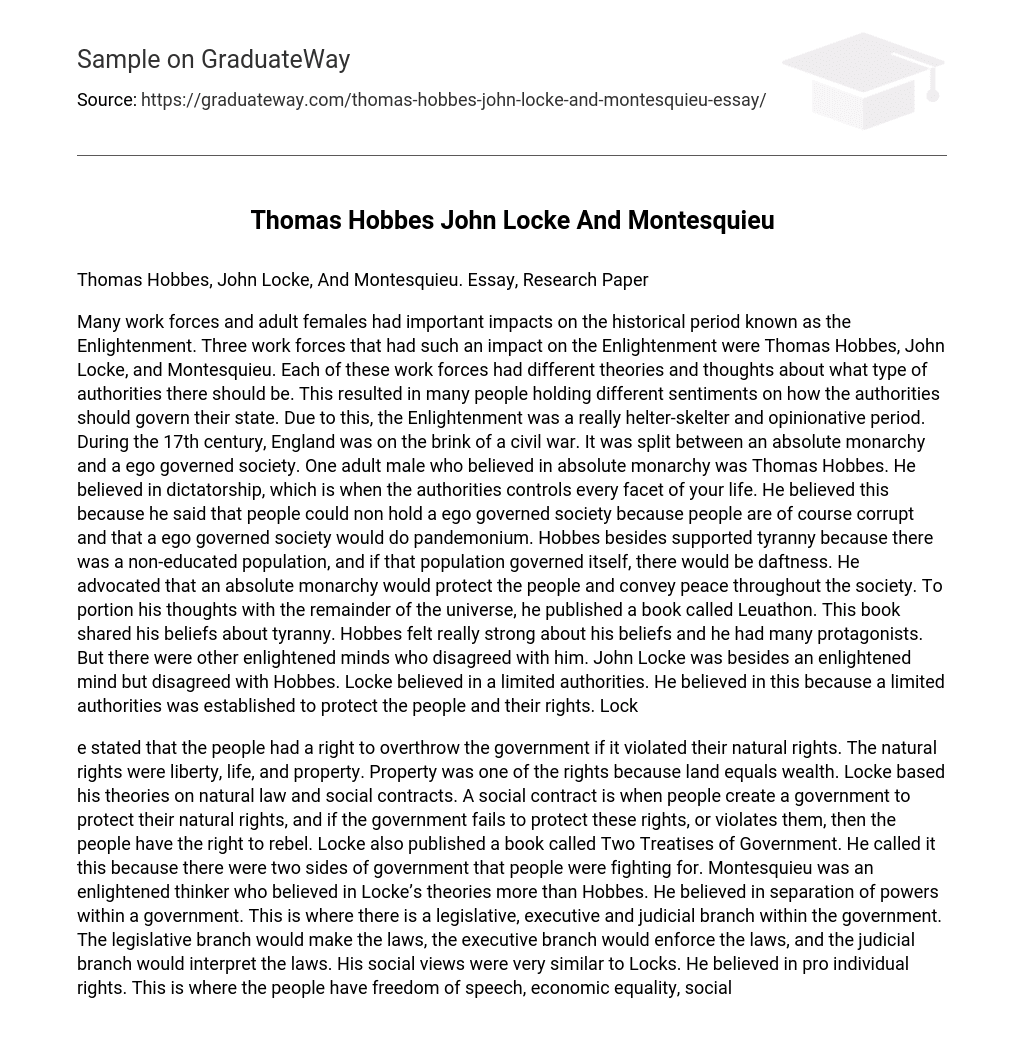Thomas Hobbes, John Locke, And Montesquieu. Essay, Research Paper
Many work forces and adult females had important impacts on the historical period known as the Enlightenment. Three work forces that had such an impact on the Enlightenment were Thomas Hobbes, John Locke, and Montesquieu. Each of these work forces had different theories and thoughts about what type of authorities there should be. This resulted in many people holding different sentiments on how the authorities should govern their state. Due to this, the Enlightenment was a really helter-skelter and opinionative period. During the 17th century, England was on the brink of a civil war. It was split between an absolute monarchy and a ego governed society. One adult male who believed in absolute monarchy was Thomas Hobbes. He believed in dictatorship, which is when the authorities controls every facet of your life. He believed this because he said that people could non hold a ego governed society because people are of course corrupt and that a ego governed society would do pandemonium. Hobbes besides supported tyranny because there was a non-educated population, and if that population governed itself, there would be daftness. He advocated that an absolute monarchy would protect the people and convey peace throughout the society. To portion his thoughts with the remainder of the universe, he published a book called Leuathon. This book shared his beliefs about tyranny. Hobbes felt really strong about his beliefs and he had many protagonists. But there were other enlightened minds who disagreed with him. John Locke was besides an enlightened mind but disagreed with Hobbes. Locke believed in a limited authorities. He believed in this because a limited authorities was established to protect the people and their rights. Lock
e stated that the people had a right to overthrow the government if it violated their natural rights. The natural rights were liberty, life, and property. Property was one of the rights because land equals wealth. Locke based his theories on natural law and social contracts. A social contract is when people create a government to protect their natural rights, and if the government fails to protect these rights, or violates them, then the people have the right to rebel. Locke also published a book called Two Treatises of Government. He called it this because there were two sides of government that people were fighting for. Montesquieu was an enlightened thinker who believed in Locke’s theories more than Hobbes. He believed in separation of powers within a government. This is where there is a legislative, executive and judicial branch within the government. The legislative branch would make the laws, the executive branch would enforce the laws, and the judicial branch would interpret the laws. His social views were very similar to Locks. He believed in pro individual rights. This is where the people have freedom of speech, economic equality, social equality, and freedom of publication. He too published his own book called The Spirit of Laws in1748. The Enlightenment was a very different period because of all these different ideas about how the government should be run.This sparked people to start thinking about the government on their own and having their own opinions. The Enlightenment was a type of revolution because it changed the way people thought and how people viewed their own government. Even though these three men were very influential, there were many other great speakers and leaders who affected the people and the government.





